
views
Meeting the Necessary Qualifications
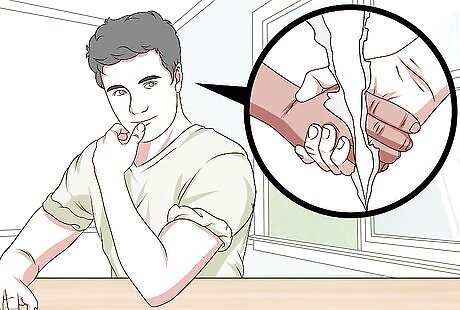
Confirm your claim is appropriate for small claims court. In New Jersey, small claims court is appropriate for issues like a breach of written or oral contract, property damage caused by a car accident, damage or loss of property, and the return of money used as a down payment. You can also file small claims for faulty workmanship or defective merchandise, poor work performed or not performed at all, and issues relating to bad checks or back rent owed. You cannot file small claims for professional malpractice by a doctor, dentist, or lawyer. You also cannot file for alimony or support payments due to a marital or domestic dispute or a claim due to a probate matter. These types of claims must be handled by a different legal process. Breach of contract are some of the most common cases in small claims court.

Hire a lawyer. Having legal counsel when you file your claim and appear in court will ensure the process goes smoothly. If you are on a budget, look for a lawyer who works pro bono or who is willing to work for a reduced rate. Search online for lawyers with good reviews or testimonials from previous clients to ensure they are experienced. You can also ask friends or family for a referral for a good lawyer.

Contact the Legal Services Program in your area if you cannot afford a lawyer. You can apply for free legal services through the program so you can good legal guidance and advice. If you do not want to hire a lawyer, you can ask legal questions through the Legal Services Program instead.
Filing the Small Claims Form
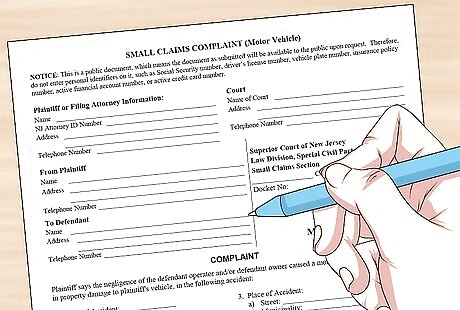
Fill out a small claims form at the county Special Civil Part Office. You must fill out and file the form at the office in the county where the defendant named on the claim lives or where their business is located. You must file the claim in person at the applicable office. You can find a list of Special Civil Part Offices in New Jersey by county at: http://www.njcourts.gov. If the defendant on the claim does not live or own a business in New Jersey, you must file the complaint in the county where the cause of the claim occurred.
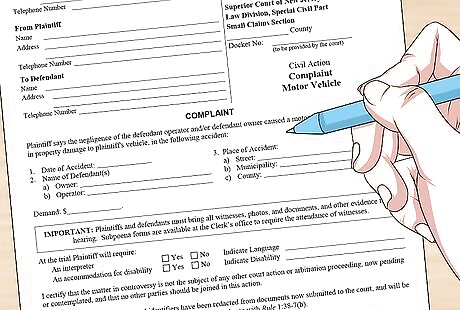
Provide personal information about you and the person you are suing. List your full name, address, and phone number. You should also include the name and address of the person or business you are suing in your claim. Make sure you also identify the person or business as an individual, sole proprietorship, partnership, or corporation. Do not include any personal, confidential identifiers about the person or business you are suing, such as their Social Security number, driver’s license number, credit card number, or financial account number.
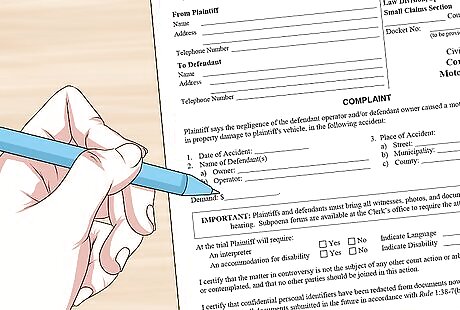
Include the amount owed and the reason you are filing the claim. List the dollar amount you are owed by the person or business as well as why the defendant owes you money. For example, you may note the person owes you $5,000 USD in back rent for 6 months. Or you may note the person owes you $7,000 USD for property damage to your home. The limit for your claim depends on who you, the plaintiff, are, not who the other party is.
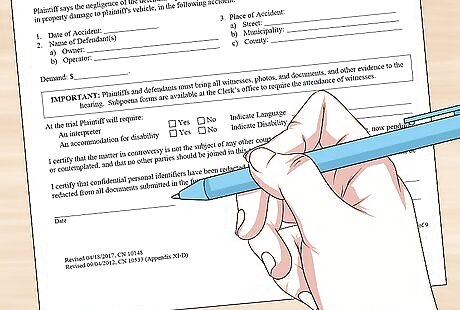
Sign and date the form. Write the current date and sign the form by hand. This will indicate that everything you noted in the form is truthful and correct.
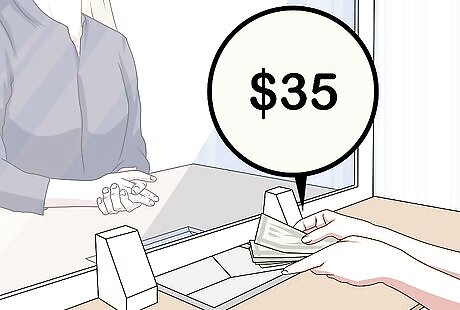
Pay the $35 USD fee to file the form. If you have more than 1 defendant listed in the claim, you will have to pay an additional $5 USD for each defendant. You can pay by cash or by check, making it out to “Treasurer, State of New Jersey.” If you cannot afford the filing fee, you can apply to the court to qualify as an indigent and get the judge to waive the filing fee.
Attending Small Claims Court
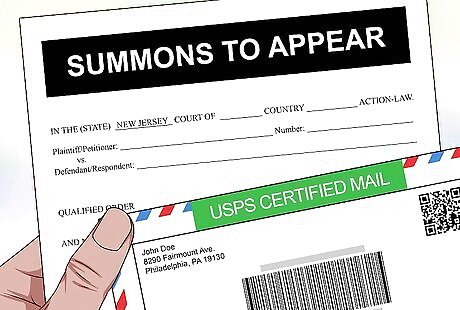
Wait to receive a summons with your court date in the mail. Once your filing form has been processed, you will receive an official summons for court. Both you and the defendant must appear in court on the date and time stated on the summons. Try not to have contact with the defendant before the court date, as you do not want to risk losing your claim by saying something incriminating to the defendant.

Bring records and documents that will support your claim. As the plaintiff, you must prove your case in court as best you can so the judge rules in your favor. Bring originals and copies of any documents that illustrate why you have a right to file the claim, such as canceled checks, money orders, and sales receipts. You can also bring other documents like bills, contracts, leases, estimates, letters, text messages, and photographs to court to support your claim. Your lawyer should be able to advise you on the best records and documents you can bring to court to prove your case. Everything that you would like to show the judge, you should bring with you to the hearing. You should organize that evidence with descriptions, dates, etc. Do your best to make it easy for the judge to understand what is going on in your case. Remember that the duty of proving your case is yours. It's your responsibility to show why you should win. You need to be able to lay out what happened in a very clear way because if you're not clear with the judge, the judge won't understand what is going on.

Arrange witnesses who can testify on your behalf. You will need to arrange at least 1-2 witnesses to appear in court and testify in person in front of the judge. Written statements, even if they were made under oath, are not allowed as evidence in court. Make sure you prepare the witnesses by asking them questions the judge may ask them in advance so they know what to expect. For example, if you are filing a small claim for property damage to your home, you may ask a neighbor who witnessed the damage to testify in court.
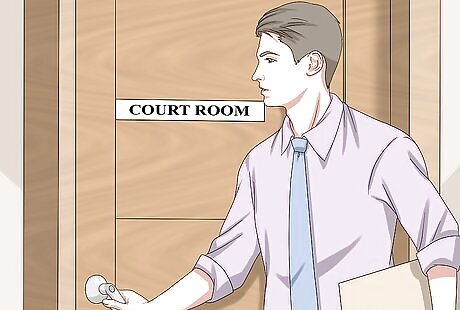
Attend the settlement hearing with a third party. On the day of the trial, the court will conduct a settlement hearing with a trained neutral third person. This person is not a judge but they are trained to help you and the defendant come to an agreement. If the person cannot help you and the defendant reach a settlement, your case will be heard by the judge on the same day. You may take an agreement at the settlement hearing if the third party rules in your favor or if the defendant agrees to your terms. You may turn down the settlement offered at the hearing if it is less you are asking for or if you feel it does not do your claim justice.
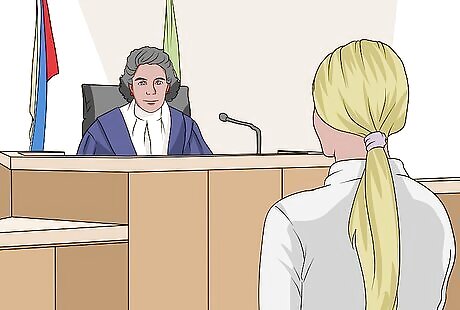
Appear in court and present your case to the judge, if applicable. If you cannot come to an agreement with the defendant during the settlement hearing, you will need to appear in court in front of a judge. The judge will then review your claim as well as any witnesses or supporting documents and make a ruling. If you are able to afford a lawyer in court, this is ideal, as they can represent you and ensure you state your case properly. Many times, though, the amount you are suing for will be more than what it will cost for you to hire a lawyer.
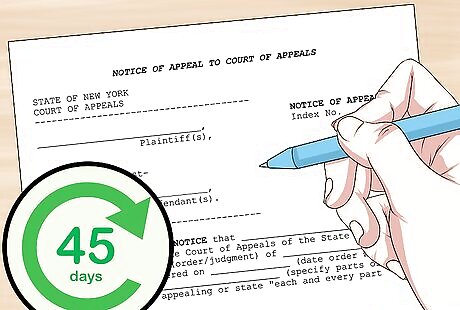
Appeal the verdict within 45 days if you disagree with the court’s decision. You must file a Notice of Appeal, a copy of the Request for Transcript, and a Case Information Statement with the Clerk of the Appellate Division. You must also give copies of these documents to the judge who decided the case, all individuals who appeared in court, and the Office of the Special Civil Part. You must then appear in court on a new date and provide witnesses as well as evidence to support your appeal. It costs $250 USD to file an appeal and you must also include a $300 USD deposit with the Clerk of the Appellate Division within 30 days of the Notice of Appeal. If your appeal is successful, the $300 USD deposit will be refunded.



















Comments
0 comment